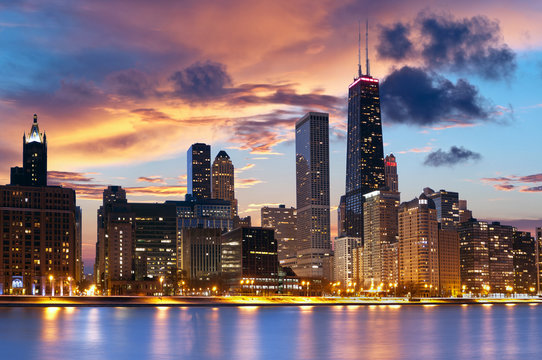Trump Plans Military Control in Chicago
By Asmita - Aug 24, 2025
Former President Donald Trump is considering deploying federal forces to Chicago to address the city's crime issues, sparking a debate on the extent of federal intervention in urban governance. Trump's proposal has led to divided opinions, with some supporting his aggressive approach and others warning of potential escalation and constitutional concerns. The move is seen as part of Trump's strategy to position himself as a decisive leader on law and order, especially in Democratic-governed cities like Chicago.

Chicago skyline via Adobe Stock
Former U.S. President Donald Trump, who has remained a dominant figure in American politics, appears to be increasing his focus on law and order as part of his broader national strategy. After previously signaling a tougher stance on Washington, D.C., Trump has now shifted his attention to Chicago, the United States’ third-largest city, known both for its cultural importance and long-standing struggles with crime and violence. Chicago has often been at the center of the national debate over policing, public safety, and the balance between federal and local authority. Trump’s proposal to deploy federal forces or even military units in the city has sparked an immediate wave of discussion across political and social spheres, reigniting questions about how much power the federal government should exercise over urban governance.
Chicago has consistently faced criticism for high crime rates, particularly incidents of gun violence concentrated in certain neighborhoods. Trump has frequently pointed to these statistics as a symbol of what he frames as the failure of Democratic leadership in major cities. In his recent comments, he suggested that the local administration and law enforcement agencies either lack the will or the capacity to bring the situation under control. By floating the idea of sending federal troops, Trump hopes to send a strong message that his approach to restoring order would be far more aggressive than the current strategies. His core supporters have long applauded his willingness to take direct, forceful measures, believing that drastic action is necessary to restore stability and safety in cities like Chicago.
The proposal, however, has ignited sharp pushback from Democrats and civil rights advocates. They argue that deploying troops to an American city, particularly one as large and diverse as Chicago, risks escalating tensions rather than resolving them. Many critics point to previous instances where the presence of heavily armed federal officers in domestic crises deepened mistrust between local residents and the government. Chicago’s leadership has also reacted strongly, emphasizing that solutions must come from community investment, systemic reform, and cooperation between local and state authorities, not by imposing military presence that resembles martial law. Legal experts further highlight that such a decision could produce a constitutional battle over the limits of executive power regarding domestic military deployment.
Nevertheless, Trump’s statement has successfully drawn national attention to Chicago and reinforced his campaign narrative of being the only leader willing to take decisive action against urban crime. His stance is also being interpreted as part of a broader electoral strategy to appeal to suburban voters concerned about safety, as well as to energize his political base with tough-on-crime rhetoric. By targeting cities governed by Democrats, Trump positions himself in sharp contrast with his rivals, portraying them as weak on security. While the plan has yet to formally materialize, the political implications are immediate: Chicago has become not just a city struggling with public safety challenges, but also a symbolic battleground in Trump’s ongoing effort to shape America’s law and order debate.


